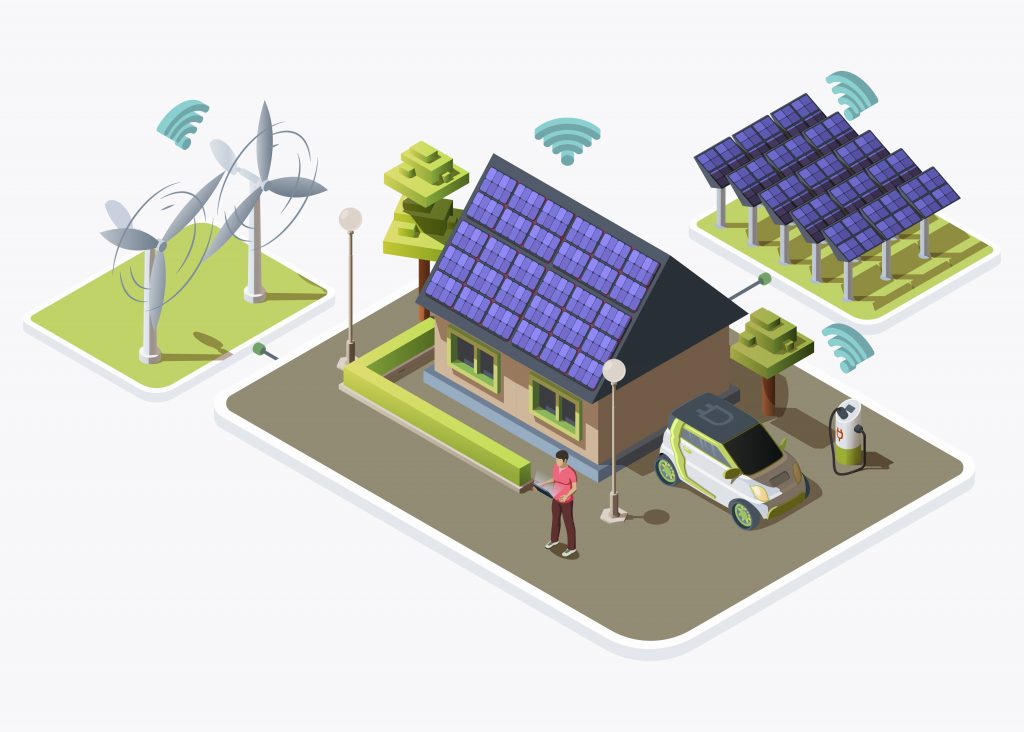Grid may not be a known term for those, who are not related to the power sector. However, one might hear it during conversation or news regarding power generation and distribution. The advent of the smart grid concept to operate electric power grids has increased the opportunities for improving overall efficiencies and performance.
A SCADA system (supervisory control and data acquisition) provides an encouraging scheme for remote access and control as well as monitoring of renewable energy sources (RES). The specifically designed modems for SCADA and electrical power industries enable operations over leased line communication circuits. We will be discussing grids and how smart grid technology empowers energy automation.
What is Grid?
Grid is the combination of equipment and accessories that enable electric power generation, transmission, distribution, and retail supply. The grid we see today was developed in the late nineteenth century. It has undergone a transformation, the introduction of advanced concepts and up-gradation of quality over the period. Even then, the basic structure and components haven’t changed much.
What is a Smart Grid?
Digitalization has changed our life phenomenally. It has influenced everything including our day-to-day activities and the functioning of mechanical and electrical systems. Nowadays, you can control everything remotely, through the virtual digital world. The enhancement it has brought in every path of life is matchless.

A smart grid will have mechanical components functioning under the command of digital systems. The administrators will have access to the mechanical part through a cloud-based setup. Thereby precluding the requirement of the person to move physically to the site or depute an employee to inspect the status, obtain parameters, and undertake periodic inspections.
The automation has several advantages that have been popularizing installation of smart grids across the globe. Companies and organizations are embracing smart grid technology rapidly. We have been fortunate to install and serve reputed entities since inception.
What are the Advantages of Smart Grid Technology?
Smart grid technology has been empowering energy automation and has been playing a significant role in energy conservation. The benefits of smart grid technology are:
Reduces Energy Loss –Smart grid technology has an important role in energy conservation. It helps the organization to reduce energy loss by indicating faulty, defective or problematic areas that may lead to loss of energy.
Boosts Productivity – The smart grids don’t require individuals to visit each of the substation or electricity generation units. Every data about the power generation, distribution and supply and be accessed from the office. With cloud-based remote technology, it can be monitored through smartphones when the administrator or the authorized individual is travelling.
Improves Reliability – It doesn’t necessitate physical inspection or exhaustive analysis of each of the components. The smart systems will display info regarding the functioning of each of the components. The technician can check the components through a computer or mobile. Further, the system reminds the authorized person about periodic and preventive maintenance falling due.
Reduces Downtime – The smart grid is monitored by computer-aided digital systems. Therefore, the technical team doesn’t have to undertake a physical examination in case of any defects. The defect identification and fault isolation process become handy with the smart grid technology. In addition, the rectification of defect liquidation can be undertaken quickly as the indication about the faulty area/ component is available.
Safety – Accidents and fatal incidents can be avoided with smart grid technology. There is no need for a person to inspect the faulty systems physically. Moreover, the functional inspection of a newly installed component or accessory can be carried out remotely. All these aids in improving the safety aspects of power grids and power distribution systems.
Security – Security is of paramount importance in the case of electric power grids. Error in operation or interference in the systems by an unauthorized/ unqualified individual can cause a lethal outcome. With smart grid technology in place, the administration can authorize individuals with responsibilities. The accessibility can be stipulated to specific individuals. In turn, elevating the security feature of the substation. The smart grid technology will accept commands from authorized individuals only.
Smart grid technology is the need of the hour. Replacing the traditional grid with smart systems integrated grids will be beneficial for the organization. It will make the energy production, transmission and distribution optimal. And will eliminate the need for a frequent physical inspection of the substation.
ASE Systems is one of the leading smart grid technology leaders, providing quality-proven smart grid technology systems. A handful of technology and communication solutions providers are determined to deliver digitized smart grid technology to entities, enabling energy conservation, and optimization of power transmission.

























